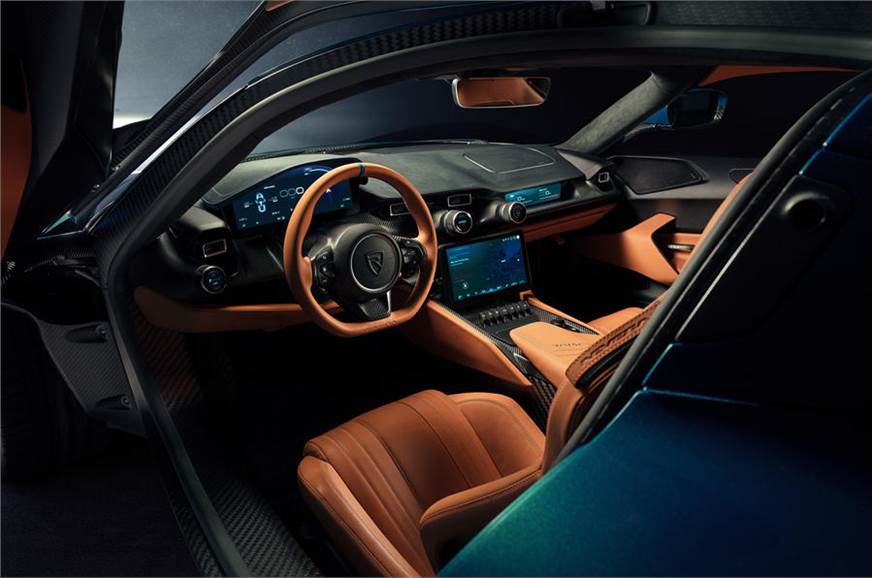
The Rimac Nevera has debuted as the production version of the C_Two electric supercar. The name is a tribute to the unexpected Mediterranean storms that occur off the Croatian (where Rimac is based) coastline, which are known to be charged by lightning. Priced at € 2 million, the Rimac will take on the Lotus Evija and the upcoming Pininfarina Battista.
- Rimac Nevera costs €2 million, only 150 units to be built
- 0-100kph takes only 1.85sec
- Top speed rated at 412kph, electric range of 547km
Rimac Nevera: the facts and figures
First up, the headlining figures – a quad-motor setup making a total of 1,914hp and 2,369Nm of torque takes the electric hypercar from 0-100kph in just 1.85sec; 0-300kph takes just 9.3sec and the top speed of the Nevera is rated at 412kph. It also does the quarter-mile run in just 8.6sec. Incidentally, Rimac has highlighted that the 0-300kph time is 2.5sec quicker than what the automaker had initially anticipated. Overall, WLTP cycle range is rated at 547km on a single charge.
Rimac Nevera: under the skin
The Rimac Nevera features a new monocoque design with an integrated structural battery pack. The carbon structure is also the largest single piece of carbon-fibre in the automotive world and weighs 200kg; it uses a mix of 2,200 carbon-fibre plies and 222 aluminium inserts. The car is powered by an H-shaped 120kWh battery pack that packs in 6,960-cell batteries; it is bespoke to the Nevera and built in-house by Rimac. The battery itself gets an advanced liquid-cooling setup that allows more power to be delivered for longer periods. The battery is also mounted very low into the structure, contributing to the low centre of gravity and giving the Nevera a 48:52 weight distribution.
Rimac Nevera: design
In terms of overall design, the Nevera has stayed pretty much true to the C_Two Concept, apart from a few tweaks in a few body panels that have further improved aerodynamic efficiency by 34 percent, as compared to the concept. The Nevera also features active aero on the underside, front bonnet, rear diffuser and rear wing – which can be set to either a low drag mode or a high downforce mode.
Rimac Nevera: new driving tech
Rimac’s All-Wheel Torque Vectoring 2 (R-AWTV 2) system replaces traditional electronic stability program (ESP) and traction control (TC) systems to further bolster grip and traction. The independent motors allow the car to infinitely calibrate the amount of power and torque sent to every wheel, depending on throttle conditions and road surfaces. The R-AWTV 2 system is said to make over 100 calculations per second to tailor the level of torque to achieve the desired driving style. The Nevera is also equipped with cutting-edge braking technology that uses a complex electro-hydraulic brake booster with brake pedal feel simulator to distribute the braking force between the friction brakes and electric powertrain, depending on the battery, powertrain and brake state. Rimac claims that this enables the Nevera to make the highest use of regenerative braking than any other car on the market today.
As we mentioned earlier, the Rimac Nevera is priced at a whopping 2 million euros. At that level, Rimac is offering not only a cutting-edge car that can outrun probably any car on a dragstrip for bragging rights, but also a nearly unlimited level of customisation for the owners, making it a truly unique car.
Also see:
2021 Rimac Nevera electric hypercar image gallery
Volkswagen in talks with Rimac over Bugatti joint venture
New special edition Bugatti Chiron revealed
Cars that have breached the 250mph mark

